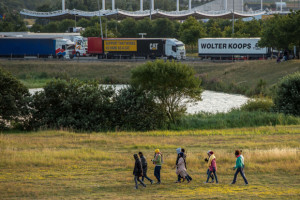
The Office for National Statistics’ prediction on UK population growth should cause the Labour Party to re-examine its position on migration. Hopefully, as a result, the Party will draw-up what’s long been needed – a socialist migration policy.
The ONS predict that the population of the UK will increase from 64.6 million to 73.3 million over the next twenty years. The drivers of this growth will be changes in the birth rate, increased life expectancy and net migration (the difference between the in-flow and out-flow of people). Of these three, net migration will have the greatest effect, accounting for 51% of population growth.
(http://ons.gov.uk/ons/rel/npp/national-population-projections/2014-based-projections/sty-2.html)
Remember Jeremy Paxman quizzing Ed Miliband before the last election …
Paxman: Do you think Britain is full?
Miliband: No, I wouldn’t say that.
Paxman: Supposing we got to a figure of 70 million in 10 or 15 years … is that acceptable?
Miliband: We have benefitted from immigration over the years but we do need proper controls.
Paxman: 75 million? 80 million? 95 million? 100 million? Is there a natural limit to the population of this country?
Miliband: I’m not going to pull a figure out of the air.
(https://www.youtube.com/watch?v=voyDsvSNnuA )
Ed Miliband was right to resist pulling a figure out of the air, but decisions on what would constitute a realistic and desirable rate of population growth and over what period of time, for the UK, do need to be made. In preparing for government the Labour Party cannot avoid making these decisions.
Some on the left argue that an open-door policy on migration is by definition socialist. Yet a large section of business has always favoured open-door, for very different and distinctly non-socialist reasons. The open-door position was never unique to socialism.
If the Party decides that it is necessary to set limits on population growth (which, in my view, is the inevitable conclusion) then it follows that a calculation will have to be made as to how many people can be welcomed to the UK in future years and, therefore, that the we will need a carefully thought -out, long-term, numbers-based migration policy.
To sketch in some of these numbers (I’m not a statistician): in the year ending March 2015, 636 thousand people arrived in the UK, including Britons returning from abroad, full-time students, people seeking work, family members joining or accompanying workers, and, asylum seekers. In that period, 306 thousand people left the UK, including returning migrants and Britons emigrating. So, net migration for that year was the difference – 330 thousand people.
There’s obvious scope for discussion here: should Brits returning home be counted as immigrants? Should students, given their restricted stay? Should asylum seekers be counted, given our duties under international law to accept them? And what’s to be made of the fact, re. Brexit, that people arriving and leaving are from both EU countries and non-EU countries?
But however these questions get resolved the ONS prediction of population growth keeps its traction, and reducing the number of arrivals is the only feasible way of controlling population growth. By how much, exactly, depends on our answers to Paxman’s questions i.e. by how much do we want UK population to rise, and over what period of time.
But a socialist migration policy must be about more than juggling numbers. It must be comprehensive. It must plan for provision to be in place to meet the needs of growing communities, so as to avoid competition for scarce resources between new comers and already established residents (both earlier migrants, their descendents and long-standing members of local communities). For people have grown weary of hearing about the economic advantages which migrants bring to the country as a whole when they do not see this reflected in the necessary expanded provision in their schools, hospitals, housing provision, social services, infrastructure, etc.
The whole system needs a barium meal, so that the direction in which the economic benefits of migration flow can be clearly observed – then, blocked and diverted back to the communities in which new comers settle.
We’re told of the extra taxes the Treasury collects from migrant workers – these should be channeled to fund increases in local provision.
We hear of the benefits to businesses – then businesses should pay a premium per migrant worker employed which, again, should support local provision.
All this should be included in a socialist migration policy in order to ensure that expanded provision is in place, in the communities where new comers will settle, before their arrival. It’s true but completely fatuous to point out that housing and schooling problems are not caused by migrants but by lack of government planning and investment. A comprehensive socialist migration policy would weld together the decision about how many migrants to welcome over a specified period with the decision about the necessary investment in the local communities they are likely to settle in. Welded together, neither decision could be made in isolation.
A socialist policy on migration would also encompass internationalism and solidarity with workers in less developed societies. We should stop issuing visas to skilled, educated workers and professionals from abroad regardless of the damaging long term effects on the human resources of their own countries. Far from demonstrating solidarity, our current migration system robs less-well resourced societies of their brightest and best, in effect exploiting them to supply our own society’s needs.
This would create problems for the UK, for example in terms of staffing the NHS, but a socialist government should create solutions in the form of expanding and improving apprenticeships and wages rather than exploiting less-well resourced countries.
Channel 4’s ‘Unreported World’ recently had a feature on blindness in Malawi which revealed that there are only 13 eye surgeons for a population of 16 million people. It struck me: there are probably more Malawian eye surgeons in London than in the whole of Malawi! I’d like to see a system where one-to-one exchanges were arranged: you let us have one of your doctors for five years and we’ll let you have one of ours. Or government-sponsored large-scale exchange schemes which supplemented and enriched the work-force of a donor country in return for their supplementing and enriching ours.
This all might sound fanciful, but Cuba manages to run an acknowledged world-class health system without bleeding-dry less developed counties; in fact, Cuba exports its health professionals to countries poorer than itself in response to crises, witness Cuban doctors leading the fight against Ebola in Africa.
Finally, UK governments have left migration’s effect on social cohesion pretty much to chance in the past. We are almost half a century late in responding in practical ways to the need to foster social cohesion in what is, now, unarguably a ‘reconstituted’ society.
Traditionally, the left’s open-door position on immigration was reactive: in the 60s fascists and their Tory fellow-travelers used migration as the focus for whipping-up race hatred. The National Front campaigned not just against immigration but for the forced repatriation of families already settled here. In the 1964 General Election the Tory candidate in Smethwick campaigned on the slogan: ‘If you want a nigger for a neighbour, vote Labour.’
In the weeks following the election a branch of the Klu Klux Clan was formed in Smethwick and black families had burning wooden crosses pushed through their letterboxes.
Inevitably, the anti-racist narrative in Britain at that time had to be vigorously supportive of immigrants and immigration. Whereas, for example, the anti-racist narrative in the American south, at roughly the same time, focused on integration in public services – primarily transport and schools – because this was what US racists violently opposed.
In other words, I believe that the left’s open-door position on migration was historically determined (at the time rightly and inevitably part of its anti-racist narrative) but that this position has outlived its usefulness. Very few on the right now campaign for repatriation. Society has moved on and the anti-racist narrative needs to move on and focus more on arguing for positive steps to achieve full and equal citizenship for all who are settled in the UK, and for practical programmes to improve social cohesion. There will be opposition enough from racist organisations to such programmes to make the anti-racist narrative an essential component of a comprehensive socialist migration policy (but alongside the other components, which must include, I believe, control on population growth).
John Wright




Thanks John for a clear and comprehensive view of issues to be considered.
You suggest a consideration of the facts around migration and detail the relevant areas that need to be considered. It is a depressing element of any party’s policy on immigration that almost none of these areas are considered .
Why do we have a democratic system that fails us so badly? I suspect that it is basically a consequence of the combination of the misleading propaganda that masquerades as education while we are at school that is compounded by the bias that is inevitably shown by the media as it organizes its stories to fit what the public want to hear.
To change the situation requires a vision that puts the well established rules for living in social harmony at the front of party policy and to demonstrate courage and tenacity in developing all party policies to be in transparent alignment with the vision.
Jesus Christ tried to change the rules of his society with some success,the problem we face is even bigger now.
Couldn’t agree more. I’m of Indian descent and have voted Labour all my life (apart from london Mayor – Red Ken’s time was truly up). When the emails surfaced during Blair’s administration that it was unofficial party policy to allowed unfetteerd immigration in order to boost the number of potential Labour supporters, the only word that came to my mind was gerrymandering.
This country has limited space, resources, etc and there needs to be a limit put in place, albeit open to review. I love Corbyn to bits (he was my local MP since before I started voting) but he needs to make some announcement on this otherwise he’ll leave a large chunk of the traditional working class vote that used to vote Labour at the behest of UKIP.